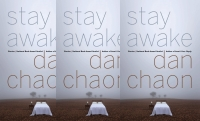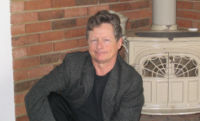§
1. How is Year Zero going so far?
My feet haven’t touched the ground. The long version’s on my blog, but the basic version of the story goes pretty much like the needle of a seismometer stuck on the San Andreas. From a 24 hour marketing brainstorm with 22 authors and a private Facebook group through the trials of Lulu changing its ISBN packages, it’s been a hell of a ride. But we now have a focused freemium platform (all our books are free as e-books on Smashwords, and available to buy as paperbacks), we have listings on the major e-fiction sites, and we’re starting to get people interested in doing reviews. It feels like we’ve gained momentum in the month since launch rather than losing, which from what I can gather is unusual.
2. The claim that you deliver works in an uncut fashion grabbed my attention, just how pure are they, what editorial process remains?
They’re exactly what the author wants them to be. That’s what I meant by the phrase uncut prose (as well as all the tacky drug ref parallels with Marx). Even if, in Oli’s case, it means his weird way of formatting using different tabs for each character means e-book formatting systems get lost with the book! I’m a natural editor and over-editor – Songs went through 26 drafts to get to where it is. So we most definitely DON’T mean slapdash, or full of typos and saggy prose. We mean we put out the words we want people to read, regardless of whether they’re in the right genre or structure.
3. In bringing the artists together what do you hope to accomplish and by that I mean is there an end game in mind or is there some sort of guided collaborative effort, or do you trust to diffusion, that in bringing all these minds together that it will rub off on others?
That’s two questions. For Year Zero, it’s pretty much like a hippy house from the 70s. We’re all crashing on the same floor and doing our stuff, and people are free to come and go as they please, but the house is always there. If someone decides they want to try for an agent fair play (hence the articles of association enshrining everyone’s freedom to do what the hell they please so long as they don’t get anyone else in trouble). If they use us to get big and leave fanning their thumb at us, fair play. And if someone whose stuff we love wants to hang around the edge and jump on if we “make it”, fair play as well. What won’t change is delivering quality contemporary literary fiction. We want readers to know they want to read the NEXT one of our books, whatever it is. Because we’re all self-publishers (we are NOT a small publisher – monetary entanglement really doesn’t aid collaboration) working as a brand for our Year Zero projects makes our life easier. What we’re always looking for is replicable strategies rather than duplicable ones, if that makes sense. Plus it’s good to have that friction from being in a group.
Of course I personally have an end-game for culture as a whole. I want to see something truly global where someone in the shanties of Sao Paolo can put up a poem, and a guy in Singapore who loves it can press a button to release some cash, and the cash has the same positive impact on the guy in Sao Paolo’s life as it would do had the poet been living in suburban London. I want to see an end to every kind of cultural protectionism. But that’s a debate the “industries” don’t yet realise exists let alone is worth entering. I’ve blogged about it a lot, but it’s not to do with Year Zero – I don’t want to paint them into my political corner. I DO want Free-e-day to be the start of something, though.
4. You’ve embraced social media and have had success with it, was that something you anticipated?
Not in the way I thought at all. I thought interactivity was the key, but it’s not. Most people act on the Net like they act in life. And in life most people want to watch. Where I’ve really found my home has been the blogosphere, and Twitter. Those are the places you can really engage, and get into a conversation – about issues rather than plotlines. I’ve been amazed how little it’s taken to find myself being asked to guest blog all over the place. And how easy it’s been to organise an online festival like Free-e-day. The answer isn’t interactivity, it’s engagement. People want to know YOU. It’s personal. That’s what works. So it’s a good job I’m a media tart.
5. Right now serials are taking off, Shya Scanlon’s Forecast 42 has been a great success, and your open-source publication of The Man Who Painted Agnieszka’s Shoes on Facebook is doing well. Why is that? Is it the format alone?
Serialisation is definitely big. It also, and this shouldn’t be underestimated, requires discipline to write (you can’t afford a single duff chapter, and your chapter lengths need to be even) so the prose tends to be tighter and the stories more gripping. It does provide a weird experience when you read it through, though.
I don’t think the web is the place or serialisation, though. I think it’ll migrate to iPhones, through sites like textnovel.com
6. If I remember right you went to Reading, did you get to catch Them Crooked Vultures?
Ha ha, yes I did and no I didn’t. I did see Bloc Party though, whom I know you love, and they were awesome. Also discovered The Joy Formidable, who are just amazing (and giving me an interview!). It was all about Radiohead, though. I don’t care how successful or popular they are, they’re in a different league from any other band. Ever.
7. Music plays a role in your fiction, do particular songs inspire you to write, do they wend their way into a scene, do you use music as background noise when writing…all of the above?
Absolutely. One technique I discovered writing my first novel, which was written from two POVs, was how you can use music to get in the zone. I wrote all (and I mean all 34) chapters of one character listening to nothing but Coldplay’s Parachutes; the other 34 listening to Skunk Anansie’s Stoosh and Rammstein’s Mutter. It was a great way of getting straight into character.
I wrote a long blog post once about music and language, and how it drives me nuts when authors are lazy and don’t think how their words sound. Rhythm, cadenza, arpeggio, they’re musical words, and most authors have only ever heard of rhythm, but they’re every bit as essential for a writer’s toolkit as a composers.
Songs from the Other Side of the Wall is even more about music, because the protagonist is a musician. I had it in my head that her music was basically like Nouvelle Vague, and that kind of bossa nova punk only with Murakami’s words set the tone for the whole piece. It’s no coincidence that my launch tour events are all half reading, half music. I’m really lucky from my music journalism that I’ve met two amazing singer/songwriters, Jessie Grace and Nikki Loy, who are prepared to share a gig with me. And because the events take place in bookshops, I’m really lucky to have written about a solo guitarist not a death metal band!
8. What one piece of advice would you give to a writer taking their first steps into publishing in general or more specifically the online publishing world?
1. Suck it and see.
2. Listen to everyone, but follow no one like a sheep.
3. Be prepared to get it wrong with your first book. And your second. And your third. NEVER say “but this book’s too precious to do x, y, or z” You’ll end up dead with a masterpiece under your bed.
9. The online lit world is seeing explosive growth right now, do you envision a settling down or will the scene continue to divide further and further to satisfy the myriad niches and interests?
The metaphor I (over)use is the big bang. Straight after there was just a big soup of dust; but soon after clouds formed, then gravity got to work and big enough ones pulled in more matter and you got stars and planets. At the moment we’ve got a big mess. I see it settling, and a new landscape emerging, where people find books through highly niche, reader-driven trusted portals. There’ll still be big, torrent-y sites that are full of stuff, but people who care will go where they know. There’ll be gatekeepers, just like now, only they’ll come from readers not randomly appointed taste-arbiting colleges.
10. Last great book you read?
Banana Yoshimoto’s N.P. Devastating.
11. Is there a sustainable and agreeable solution to pricing e-books and online content?
Yes, it’s entropic, like everything else. At the moment there’s a lot of energy still, but prices will settle. Publishers will go on trying to charge ten dollars or more as long as they can, until new players come along and get big enough that everyone realises the right price for basic online content is free, and you need to give people something else to pay for (which they will).
12. Was there a specific catalyst which led you to writing?
Yeah. It’s really weird. When I was six, my mum came home and told me a gypsy had stopped her in the street and told her she had a six-year-old son who’d make his fortune with pen and paper (or keyboard!). I’m sure she wasn’t psychic, but it certainly became one of those imago-type things in my head.
13. Name drop a deserving writer our readers should go find.
A published one people should have heard of and may not have? Two – Josephine Hart, whom I thought was huge because she wrote Damage which was a film with Jeremy Irons and Juliette Binoche, only no one in most bookshops even has heard of her and her second book Sin is out of print. Damage is the bleakest book you’ll ever read. Absolutely brutal. And Marie Darieussecq, whom I occasionally type into Twitter search for fun. Mal de Mer (Breathing Underwater) is a tour de force.
An unpublished (ish) writer who’s not part of Year Zero. Easy. Sabina England, she’s @ on Twitter and Deaf Indian Muslim Anarchist on Blogger. She’s written several produced plays and is currently hawking her first novel, Brown Trash. I keep telling her to let Year Zero have it but she wants to try for an agent. It’s a trailer trash novel with an Asian-American protagonist. It’s the best coming of age book since Less Than Zero.
14. Thanks for your time.
No, thank YOU, as I believe they say.
–
Interviewed by Patrick McAllaster









Pingback: Dan Holloway:Interview | Emprise Review
Pingback: Tweets that mention Dan Holloway:Interview | Emprise Review -- Topsy.com
Pingback: New Year Zero interviews on the Web « Writing for Readers